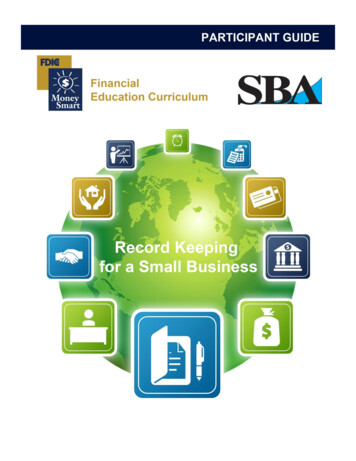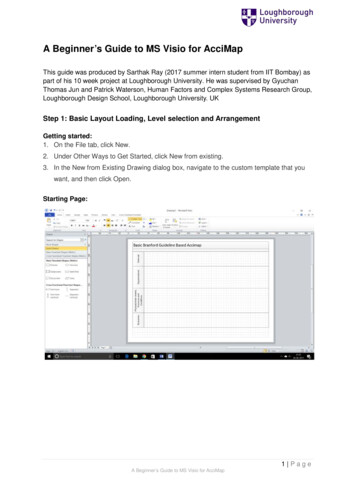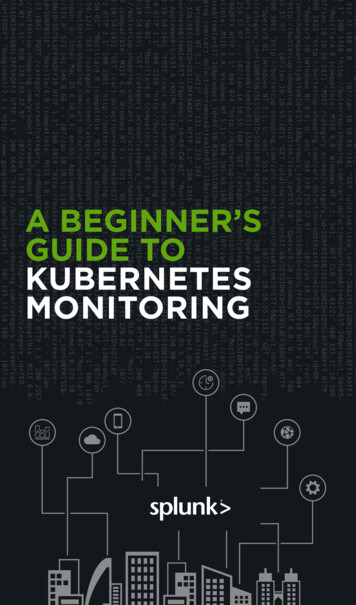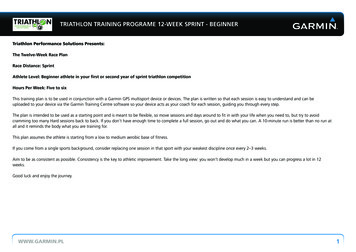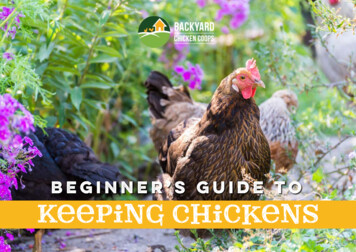
Transcription
beginner’s Guide toKeeping chickens1
Let the adventure begin!Animal lovers choose to keep backyardchickens for many different reasons thatrange from the ordinary to the extraordinary.Many aspiring first time chicken ownersbecome dizzy with excitement when theydaydream about opening up their nestingbox one dewy morning to collect their dailysupply of scrumptious farm fresh eggs.Other more quirky bird lovers might chooseto keep pure bred chooks so they can trytheir luck in the high stakes world of poultryshows. While some Chicken Ladies orLads simply feel emotionally compelled toadopt battery hens to spare them from thebrutalities of factory farms.What everyone discovers, no matter whattheir reasons are for keeping chickens, is thatchooks are some of the gentlest, sweetest,most loving and easily available pets to keep.Whether you’re raising hardy ISA Browns orfluffy Silkies, chickens are always generousby nature, freely offering their kindheartedowners unconditional love, affection and ofcourse, plenty of tasty eggs. You’ll never beshort of a reason to love your chickens.2
Top 10 most common Questionsabout keeping pet chickensJust because humankind has been caring forchickens for thousands of years that doesn’tnecessarily mean that your average pet loverinherently knows anything about lookingafter these cute and quirky creatures. Ifyou’ve never looked after chickens before oryou simply need to brush up on the basics,be sure you get off to the right start by givingthese top tips a quick read.3
1. Can I have just one chicken?Chickens are flock birds, they are highly sociablecreatures that thrive on the company of their own kind.They love to have little conversations with one another,alert the flock when they find food or sound the alarm ifdanger is near.These flock creatures can even affect each other’sphysiological behaviour! What does that mean? Well,for example, if one hen starts laying an egg, this maystimulate egg-laying behaviour in the other hens.Moreover, they’ll often all like to use the exact samenesting box. Chickens take social and physiological cuesfrom one another, so, if a chicken is left alone, they beginto lose sense of what they are. Sadly, chickens who livealone tend to have a reduced life expectancy, so it’s bestto ensure that they have at least one other feathery friend.We recommend that you start with 3 birds - they’ll formtheir own social hierarchy and will look after each other.Chickens also like to snuggle together when they sleep,so three hens will be nice and cosy.4
2. How much space do chickens need?Some country chicken-lovers let their flock free-rangeacross acres of wild terrain, whereas others in citiescomfortably house their girls in large coops and runs.Whatever your backyard situation, the important thing toremember is that chickens want as much safe space asyou can afford to give them.However, all chickens will love the opportunity to freerange in a securely fenced backyard during the day or atleast a few times throughout the week. Try to establish aroutine in which your flock can graze safely and flap theirwings in your backyard as often as possible.Chooky’s Tip - Free rangingyour girls means fertilised lawnsand grub-free gardens!It’s a wing-wing situation!5
3. What do chickens eat?In many ways chickens are incredibly pure and simplecreatures that love routine. Your flock will need a regularsupply of chicken feed, shell grit and water, which are thecornerstones of every healthy chicken’s diet. Ideally theflock will have uninterrupted access to food. Chickensrarely overindulge on feed so there really is no need toworry that your ladies will pack on the pounds.Chicken Feed Pellets - Pellets are made up of all thethings your chook needs to thrive! Ground up grains,seeds, vitamins and minerals are shaped into easy toconsume pellets for your flock. Check the ingredients list,but usually this is a suitable cheap option for your girls.Chicken Feed Lay Mash - Mash feed is a mix of crushedand whole grains and seeds with added vitamins andminerals. It differs from pellets in that it encouragesmore natural foraging behaviour. Once again check theingredients list, as some brands use ‘fillers’ with limitednutritional value.Shell Grit - Shell grit aids your chook’s digestive systemby providing roughage for their tummies and it’s a sourceof calcium - good for the creation of strong and yummyeggs! Younger birds will need finer grit. Hens which freerange a lot tend to pick up most of the grit they needwhilst foraging.6
4. good treats and bad treatsA common misconception is that you can feed yourchickens anything. Well, chickens do seem to literally eatanything, but that shouldn’t imply that everything they eatis necessarily good for them.Things like leafy greens, berries and porridge go downa treat for your chickens and contain lots of nutrients tokeep them healthy. Chickens will love chowing downon more indulgent treats like cracked corn, mealworms,yoghurt, bread and pasta, however they can easily losecontrol and overindulge.Chicken feed pellets and mash are designed to give yourgirls a balanced diet. Chickens will naturally supplementtheir diet with their foraging. If you feed your girls kitchenscraps and treats like mealworms, make sure this foodsource ends up being no more than 25% of their totaldaily food intake.There are some foods that should not be included in achickens diet. Onions, oranges and tomatoes may soundhealthy to us, but they can make your chickens veryunwell. Uncooked rice, apple seeds and chocolate aresome other no-go chook food types. Always give yourkitchen scraps a quick once-over before you let your girlsat it.7
5. How often do chickens lay eggs?Different chicken breeds lay at different rates, with somebreeds only producing 80 eggs a year and others morethan 300 a year. All breeds lay eggs but some have beenbred to accentuate certain aspects of their appearance,like their feathers or size, to make them all the moreadorable.Chickens need a good balanced diet with plenty ofcalcium and water to lay at their peak rate. Temperatureextremes, biannual moulting, stress and not enoughsunlight are some factors which will affect how manyeggs your girls produce. Chickens are incredibly lightsensitive and need about 14 hours of sunlight a day tobe in top form. They really are early birds! Plush nestingboxes and plenty of perches and lots of friends aroundthem will help your girls lay more eggs too.8
6. What kind of expenses can I expect?All things considered keeping chickens is exceptionallycheap compared to many other types of domestic pets.After the initial setup cost, the monthly cost is fairly small.Chickens simply need to have a regular supply of feed,water and bedding to live happy-go-clucky lives. For asmall flock - feed will be about 25 per month, bedding 5-30 per month depending on the type you use. Theirhealth needs average about 20 per quarter total - forworming, lice and mite treatments and prevention.7. Can I keep chickens in my suburb?Every council in Australia has regulations for keepingbackyard chickens, which means there are hundreds ofslightly different rules and conditions all over Australia.Types of considerations include flock size limits - inaccordance to the size and location of the property.There also tends to be criteria surrounding the cooprequirements and how it is maintained. Many councilsprohibit roosters in suburban areas. To find out what youneed to know about keeping chickens in your local areasimply call your local council for further guidance.9
8. Will chickens mix with my other petsand be ok around children?Many chicken breeds like to be handled and becomegood friends with children. Families like that chickensprovide eggs in addition to cuddles. They’re also a way forfamilies to reduce their carbon footprint, eating kitchenscraps and providing soil-enriching manure. A small flockof feathered friends can teach your kids responsibility, torespect where food comes from, as well as showing themthe circle of life first hand.Chickens can also live very happily alongside your family’sdogs and cats. In the beginning, slow introductions andspending time establishing the relationships and teachingexpected behaviours pays off. Often the chickens andother pets become firm friends and genuinely miss eachother if separated.10
9. Do chickens make good pets?Specific chicken breeds tend to have very similartemperament traits. However every chicken has its ownpersonality. Moreover, anyone who has kept chickensbefore knows that every flock has a very complex socialhierarchy. Ask any Chicken Lady or Lad and they’ll be ableto tell you in detail the intricate social maneuvers thattake place in their coop on a daily basis.All breeds of chickens are inherently social creatures.They communicate with each other, develop friends andfoes within the flock. That means it isn’t uncommon forchooks to engage in dramatic feuds with one another, butby the same token they are able to form close and lastingfriendships with their flock allies. The fact that all chickenshave delightful, unusual and quirky personalities makesthem one of the most fascinating pets to keep in yourbackyard. It’s like having your own TV soap opera takingplace in your backyard 24/7.10. Is there anything I need to do beforeI get my chickens?Pet ownership is always an important responsibility thatneeds to be taken seriously. Chicken are quite a lowmaintenance pet and do not need a large area or lots ofyour time. However, consider the holidays you like to takeand people you’d ask to step in top up their water andfeed? You might think about making your run larger andgetting an extra feeder if you go away lots ofweekends.If you’re in a part of Australia where you could havenocturnal predators (foxes, dogs or quolls) considertaking extra precautions in your coop set up, to stop themfrom burrowing in. You might want to sit the coop onmesh and set up a motion-sensor light near the coop.11
Layers, lovers or divas?All chickens have unique, quirky and originalpersonalities. One of the great joys of owning a flock offeathery individuals is discovering all the distinct, unusualand charming qualities that make every bird in yourflock one of a kind. If you have owned dogs or cats you’llunderstand what this is like and chickens are no differentwith their unique personalities.Whether you’re caring for ISA Browns or PlymouthRocks each breed of chicken has their own funky way ofdoing things. You’ll soon unlock your flock’s secrets anddiscover what makes your chickens tick. Every chookis unique for its own reasons but generally speakingchicken kind can be broken into three fun categories!12
LayersEggs abound when you’ve got a flock of dedicated layers. Though all chickens lay eggs, some girls prefer to spend moretime in the nesting boxes than others. Any egg-lover definitely needs at least two prolific layers in their coop.ISA Brown - 300 Eggs Per YearISA Browns are one of the most popular choices for backyard chickenkeepers and farmers alike. These girls are hybrids of Rhode Island Redsand Rhode Island Whites resulting in a breed that is widely adored for theirresilience, gentleness and their egg-straordinary egg laying talents, whichleave all other hens in the dust-bath!Australorp - 300 Eggs Per YearThe locally bred Australorps are a favourite in many Australian backyardsdue to their brilliant black, white or blue plumage, eggceptional egg layingability and their characteristic happy-go-clucky Aussie attitude. Thesegirls are tough on the outside and soft on inside. Australorps are hardyand cope well with our weather extremes. Their softness stems from theirbroody tendencies. Aussie, Aussie, Aussie - cluck, cluck, cluck!13
LayersLeghorn - 300 Eggs Per YearThese Italian egg laying wonders are more energetic than many of theirpeers. They can be flighty, but are full of vim and make entertainingbackyard pets. White Leghorns are adored for their egg poppingprowess however sometimes they can get a little skittish. These girls willnever be baby in the corner - they’re intelligent and will get very excitedwhen they see you.Rhode Island Red - 300 Eggs Per YearChances are if you don’t know which chicken is best for your environmenta Rhode Island Red will do just perfectly! These chickens lay eggs-tremelywell, they thrive in the cold and are generally hardy in every other sense.They are also active foragers, always on the lookout for a tasty treat orgarden grub! This breed features heavily in paintings, signs and chickenabilia you might find in homeware stores.14
LoversAll chickens are sweet, loving and gentle, but some feathery ladies simply have more love to give than others. Generous,caring and oh-so cuddly, these chickens will flap their way into your heart in no time!Orpington - 300 Eggs Per YearCute, courteous and courtly, Orpington chickens are easily one of thebest mother’s in the animal kingdom. These regal chooks are maternal bynature and they love nothing more than crawling on top of a nest full ofeggs. They’ll never shy away from a cuddle or two from their owners too!Need eggs? Orpington chickens will keep you in a constant supply, noquestions asked.Plymouth Rock - 200 Eggs Per YearResplendent in body, mind and soul, Plymouth Rock’s are relaxed andreliable chooks that you’ll love to love. Their mottled plumage meanstheir often sought for looks alone, but many find they become a positivecalming influence on the flock. Affectionate by nature these chilled outmummas are always ready with a kiss and a cuddle when you need itmost. Lower your defenses and let these loving ladies soar into your heart.15
LoversSilkie - 150 Eggs Per YearSilkie chickens stand out because of their fluffy and puffy plumage, as wellas their five-toed feet. Saintly, docile and peace-loving, silkie chickensnaturally radiate a feeling of serenity, which makes them perfect forfamilies with young children. Giant fluff-balls, these tranquil ladies donot mind being handled and are generally calm in the presence of noisychildren.Naked Neck - 120 Eggs Per YearNaked Neck chickens are famous for having featherless necks, as well astheir cool, calm and collected personalities. They cope well in hot areasand when others might shy away from a cuddle, because it’s too hot,these girls can still be quite broody. What these ladies lack in conventionalstandards of beauty they make up for with their lovable personalities.16
DivasStrange though it may seem, some chickens are simply not that interested in sitting in a coop all day laying eggs. Somechickens like to live the glamorous life. Some chooks are divas at heart, through and through.Frizzle - 150 Eggs Per YearTo the untrained eye, Frizzle Chickens may appear like someone who hashad an unfortunate blow dry, with their frazzled plumage and short erectbodies, these girls truly are avany garde style icons. Frizzle chicekns areglitzy girls, but are calm relaxed and easy to please, making them a perfecrclassy addition to any chicken Lady or Lad’s backyard. These girls willchallenge your pet naming creativity - ‘Hennie’ is just not going to cut it!Polish - 200 eggs Per YearPolish chickens have exceptional senses when it comes to fashion! Thesegirls are always ready to strut their stuff down the runway. But, be careful,these chicken fashionistas have trouble seeing through the fan of feathersthat naturally grow in front of their eyes. Their beauty can also see thempicked on a bit by the rest of the flock, and problems can arise if theirfeathers get too wet. These girls are more high-maintenance than otherhens, but owners always insist they’re totally worth the effort.17
DivasBarnevelder - 200 Eggs Per YearBarnevelders are exceptionally good looking chooks, with couturepatterned feathers and deep jewel colours, they’d set any runway on fire.These girls are renowned for being a touch on the sassy side and appearto strut when they walk. This breed can be hard to find, but that makesthese chook models so much more exotic and precious. Even the mosthardened chicken lover will soon become mesmerised by their iridescentgreen plumage.Belgian D’Uccle - 150 Eggs Per YearShort and wide these ladies turn heads with their ability to accessorise.Pristine fan-shaped pert tails, Elizabethan ruffled necks, diverse colouredcombs and an impressive array of plumage colours. These girls know howto dress to impress! Some of their official colour varieties sound like acosmetic collection - lavender, porcelain, blue, silver quail, cuckoo, goldenneck and mille fleur! Belgian D’Uccles will bring the bling and be thetreasured jewels of your flock.18
Getting ready for chickensPreparing for chickens in your backyardcan be very exciting and also a littleoverwhelming at times. Though it may seemas though there are a million different thingsto consider before you even get chickens, inreality it is fairly straightforward. That’s whywe’ve prepared these handy checklists thatsystematically go through everything youneed to consider before moving a flock offeathery ladies into your backyard.Chooky’s Tip - Don’t forgetto think of chicken names! Themore funny and cute the better!19
What should I do first?Be prepared to commit asmall amount of time and loveeveryday to your flock of cuteand cuddly chickensBuy a strong, secure andwell-ventilated coop that willkeep your flock safe and happyall year longKnow the City Councilregulations for backyardchickens in your area - howmany chickens are allowed?Chooky’s Tip - It’s a good idea to pop over the fence andlet your neighbours know that chickens are coming to town.Happy neighbours equal happy chooks!20
What do I need to check in my backyard?Ensure your chickens haveaccess to some grass and dirt inthe backyard for foraging anddust-bathing.Make sure you haveenough free yard space toaccommodate a coop, run androom for your chickens to graze.Is there a spot where your coopcan be on solid and level terrainand partially shaded? Under atree? Near a shed?Chooky’s Tip - Every new chicken keeper needs to give theirbackyard a quick scan before their new flock moves in.After all, your backyard will become your flock’s home, so youneed to ensure that their surroundings are chicken-friendly.21
How do I work out which breeds to get?Picking which chicken breeds your flock will comprise of is a fun part your overall chicken journey. In many ways it islike casting actors in a play or movie. You’ll need to decide on the number of chickens you wish to care for, as well asthe breed type(s) that will best meet your own eggs-pectations. Here are some key reasons you may have for wanting tokeep chickens.EggsIn case you didn’tknow chickens layscrumptious eggs!Great GardensChicken manureis great naturalfertiliser for yourgarden.SustainabilityReduce your carbonfootprint!PetsChickens are gentle,sweet and friendlycreatures that lovenothing more than akiss and acuddle.EducationA great, multifaceted learningexperience forchildren.Chooky’s Tip - If the chicken breed is onsale in your local area that is a good indicationthat it is well suited to your climate22
Top 10 backyard chicken breedsResearch the range of breeds available in your part of Australia and work out if they’re a good match for your climateand family. Generally if they’re available locally, those chickens will cope with the heat or cold you’re likely to experience.We’ve put together a list of our top 10 backyard chicken breeds to help you decide. Click the link in their name to learnmore!ISA BrownPlymouth RockBarnevelderAustralorpNaked NeckOrpingtonSilkieNew HampshireFrizzleBelgian d’Uccle23
Do I need to free-range my chickens?Generally speaking chickens want to free-range as muchas possible. They like to sleep, cuddled together on aperch and put themselves to bed at dusk. In the wild,chickens would huddle together on branch about 1m offthe ground. They’ll love the cosiness of a dark hutch andwill feel very settled going to sleep in that environment.Chickens are very sensitive to light, so as dawn breaks,they’ll naturally want to be out catching the worms! Ifyou’re yard is not properly fenced, then an enclosed runwill be perfect for your flock to start scratching andforaging for food. That way they’ll be safe from foxes andyou’ll also stop the flock visiting your neighbours beforeyou’re out of bed!Chooky’s Tip - Freeranging your girls saves youmoney on feed! Ladies liketo lunch on garden grubs,weeds and seeds. Just keepyour precious flowers anddelicious veggies safe behindsome Backyard Chicken Coopspoultry fencing.24
Poultry Supplies & EquipmentKeeping chickens is a breeze if you have the right equipment and supplies to make sure your flock is happy and healthy.Not only will your new chooks appreciate it, but it will make your life as a devoted Chicken Lady or Lad much easier.Have a peck at these essentials for caring for your flock.25
Chicken CoopsA chicken coop is perhaps the most important piece ofpoultry keeping equipment every chook-lover will needto own. In an eggshell, a chicken coop needs to keep theflock safe from predators at night, provide them withperches to rest upon and nesting boxes to lay eggs in.More sophisticated chicken coops also have handyfeatures, such as removable cleaning trays that make lifeeasy, inbuilt chicken runs so the flock can always play safeand numerous points of access, so your girls will alwaysbe within an arm’s reach. Ensuring that your flock has asafe, secure and well-designed coop to go home to everyevening is perhaps the greatest gift that any chicken lovercan give their feathered friends.Chooky’s Tip - Hose thecleaning trays off over yourveggie patch – that way theyget a water and manure atthe same time!26
Chicken runTo put it simply a chicken run is a fenced and enclosedextension that usually connects directly to the thechicken coop. This allows the flock to free-range, foragefor food, dust bathe and flap their wings to their heartscontent. Active chickens are happy chickens and achicken run gives the flock the opportunity to exercise,bask in the fresh air and sunlight, absorbing someessential vitamin D.One of the most important reasons for having a chickenrun is to keep your girls safe from predators while theygo about their day to day business. Some owners chooseto plant flowering bushes, shrubs, herbs, vines and otherplants inside the chicken run, as it helps to block the lineof sight of potential predators. The plants provide healthyall natural treats for the flock, while also creating a naturalshade solution, which is vital during those hot Australiansummers. Unless your backyard is totally safe frompredators, a chicken run is an essential structure thatevery poultry lover must own.27
Chicken tractorIn essence a chicken tractor is a coop on wheels thatcan be regularly repositioned to different spots in thebackyard. A standard chicken tractor comes with eithertwo or four wheels and generally speaking, the morewheels it has the easier it is to move. Keeping your flockin a chicken tractor is one of the easiest ways to dispersetheir soil enriching manure all over the backyard - andlets the chickens find new colonies of bugs. Some peopleprefer to keep their chickens in a standard coop at nightand move them into a smaller chicken tractor duringthe day. Though having a chicken tractor on hand is notessential, it is one of the easiest and most flexible ways tohouse your flock safely.Chooky’s Tip - move thechickens under shady treesin summer. Move the coopto sunny spot in winterwhere the girls can warm up!28
Coop Security & Predator preventionThough there is no substitute for a quality, robust andsecure coop there are a range of extra accessories widelyavailable that can help keep your flock safe.Wire Mesh FlooringFor most backyard chicken keepers wire mesh flooringis an essential accessory. Wire mesh flooring basicallycreates another obstacle between your chickens andburrowing predators, like dogs, foxes and quolls. Mostchicken owners simply roll the wire mesh flooring out onthe floor and the weight of the coop holds the materialin place. Alternatively, some chook lovers bury the wiremesh flooring a few centimeters beneath the soil so thattheir flock’s feet aren’t touching the wire.Sensor LightsSensor lights are another common accessory to helpkeep your chickens safe. Basically a sensor light scaresoff predators by flashing a bright light whenever anynaughty nocturnal nastiness creeps near the coop. Also, asensor light is a handy gadget to have if you’re the type ofchicken owner who likes to say “good night” to your girlsafter sundown. If you often get home after dusk, a sensorlight lets you collect eggs without carrying a torch.29
Automatic Door OpenersAutomatic door openers are an ingenious chickenkeeping innovation, which opens and closes the doorto your chicken hutch to ensure that your girls getplenty of access to the outdoors during the day, whileremaining safe and secure at night. This enables chickenlovers to establish a healthy routine for their flock thatpromotes optimum egg laying conditions during thewarmer months, as well as adding another obstacleagainst predators all year round. Best of all, you’ll be ableto stay in bed while the automatic door opener lets yourchickens out into the yard or run.Chooky’s Tip - Checkout our Protect Your PetseBook and make sure yourgirls are safe and sound!30
Chicken FeedersA chicken feeder is essentially the vessel that will hold thefeed for your feathered friends. One of the major designchallenges for most chicken feeders is preventing cheekychooks from knocking the container over. Chooks lovescratching, pecking and exploring the world through thetips of their nails, which often involves knocking, tossingand flipping all manner of things over - including thechicken feeder. A superiorly designed chicken feederwill be both easy for your chooks to eat from but alsodesigned in such a way that will prevent them fromtipping it over and creating all sorts of mess and chaos.Chooky’s Tip - Keepyour feed secure fromvermin by putting it away atnight and not throwing feeddirectly on the ground!31
Suspended Chicken FeederOne of the most popular chicken feeder types is thesuspended variety. Basically, a suspended chicken feederis tied to the roof of the coop and hangs at about theheight of the chicken’s neck. This is done so that thechooks won’t be able to scratch and pull at the base ofthe chicken feeder and knock it over. They will be ableto peck and munch by the chicken feeder with ease anddelight. With suspended chicken feeders it is often betterto get a rubber made tray, as metal and aluminiumtrays tend to rust.Treadle Chicken FeederA treadle chicken feeder is a heavy feeding box with aplatform mechanism that the chickens stand on, whichlifts the lid of the device open so that the chicks canchow down. This is a great innovation as it helps protectthe chicken feed from bugs, mice and rats that are oftendrawn to the delectable scent of the grain. The chickensmay have a little trouble working the equipment out atfirst, so do keep an eye on them to make sure all yourgirls are having something to eat.PVC Chicken FeederA PVC feeder is constructed out of new or used piping orplumbing. Most PVC chicken feeders are quite large, runalong the side of the coop, with an outward turned spoutthat prevents the feed from falling loose and also inhibitsthe chickens from scratching the feed out. As thesechicken feeders are quite exposed and hold more feed,they aren’t the greatest when it comes to deterring grainloving pests from your garden. This being said, they areprobably one of the most simple and streamlined chickenfeeders available.32
Animal Bedding For Your ChickensAnimal bedding or floor litter is used in chicken coops tohelp absorb chicken manure that naturally occurs whenkeeping chooks, as well as providing comfortable footingfor your chickens feet and a soft landing spot for the eggsthey will lay. Ensuring that your hen house has plenty offresh, clean and absorbent animal bedding is one of thebest ways you can maintain the health and hygiene ofyour chickens. Generally speaking animal bedding shouldbe changed whenever you smell a buildup of bad odoursor if there are any obvious signs of mess.To take away the guess work we have compiled a list ofdifferent popular types of bedding and weighed up thepros and cons.Chooky’s Tip - Changeyour bedding regularly! Oldsoiled bedding can createmould spores and cause healthproblems for your girls.33
Hemp BeddingHemp bedding, made from the hurd of the cannabisplant, is one of the best types of bedding available for anychicken lover. It’s an odourless, absorbent and organicproduct that will not only help keep your coop staycleaner for longer, but will also act as a natural pesticide,which will keep all sorts of creepy crawlies out of yourcoop. Though it is on the pricey side compared to othertypes of bedding it is considered to be the most reliable,long-lasting and effective type of animal bedding on themarket.We love hemp bedding! Why? Well have a peck at thesereasons: Most absorbent type of bedding on the market.Natural pest repellent.Great for the garden.Less likely to develop dangerous mould spores.Chooky’s Tip - Your usedHemp Bedding can be putin your compost or thrownstraight onto the veggie patch!34
Straw BeddingThere are lots of different straw options available:wheat, oat, barley, rye and so on. Some straws, like wheatand oat, are particularly absorbent, which will makecleaning your coop easier, however, it rarely holds upin the rain and often becomes mouldy, unhygienic andsmelly. Straw is reasonably inexpensive but won’t last youvery long. Also, some animals may try and eat the soiledstraw, which can result in illness.LeavesLeaves are a nice natural alternative but they aren’tparticularly absorbent. Some chicken lo
their reasons are for keeping chickens, is that chooks are some of the gentlest, sweetest, most loving and easily available pets to keep. Whether you’re raising hardy ISA Browns or fluffy Silkies, chickens are always generous by nature, freely offering their kindhearted owners unconditi
